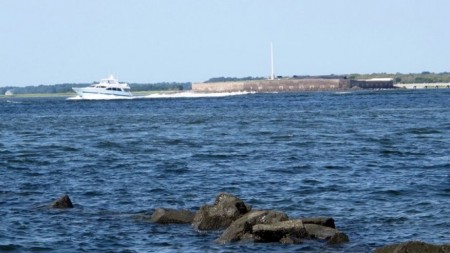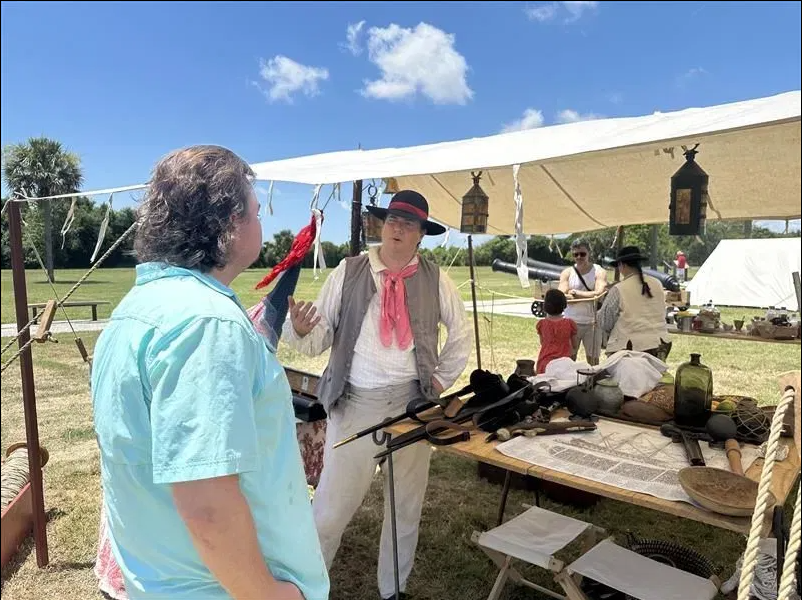NORTH CAROLINA: Fayetteville Civil War Museum Would Have Wilmington Ties
Fundraising has begun for a proposed $65 million N.C. Civil War History Center, scheduled to open in 2020 in Fayetteville.
“We want to tell the whole story, not just (focus on) battles,” said David Winslow, senior consultant for the project.

When it opens in 2020, the new $65 million Civil War History Center will tell the story of all participants in the Civil War, including slaves and Native Americans.
Winslow, who has worked on fundraising projects forThalian Hall, the Bellamy Mansion, the Battleship North Carolina and Elderhaus — said the history center has strong ties to Wilmington. James R. Leutze, the former chancellor of the University of North Carolina Wilmington, chairs the museum’s board of advisors, which also includes former state Sen. Frank Block, University of North Carolina Wilmington professors Chris Fonvielle and Philip Gerard and Southport residents Wallace L. Rueckel Jr. and Musette Steck.
Mary Lynn Bryan, a part-time resident of Wrightsville Beach who is editor-in-chief of the Jane Addams Papers at Duke University, serves on the center’s board of directors.
With an estimated cost of $65 million, the facility will be located near the ruins of the former Confederate arsenal at Fayetteville, which was burned to the ground by Gen. William T. Sherman’s forces in 1865.
Winslow said plans call for a “teaching center” rather than a “collecting museum.” “We don’t want to get burdened with artifacts,” he said. “We want to tell a story.”
That story, he added, would be a “more nuanced approach” to the period, representing women, African-Americans, Native Americans, Quakers and others whose stories are not often told.
“We want to show what it was like to live in North Carolina before, during and after the Civil War,” Winslow said.
“Even then, North Carolina was a ‘purple’ state,'” he joked.
Opposition to joining the Confederacy was widespread, he noted. In Forsyth County, for example, citizens voted 4-to-1 against secession in 1861.
Block said organizers hope that, as well as reaching students, the center can train teachers as well.
“A lot of the issues people were dealing with before and after the war are variations on issues we’re facing today,” said Gerard, who wrote a 45-page treatment as the basis for the museum’s exhibits. “This is still very relevant.”
“We plan to tackle difficult issues without setting off any land mines,” Winslow said.
Consultants for the project — who also worked on the International Civil Rights Museum in Greensboro — are drawing up a “digital master plan” with a strong online component, Winslow said. He foresees the possibility of “virtual tours” of Fort Fisher from the center in Fayetteville, or tours of the center from Fort Fisher.
Roughly $6.2 million has been raised for the project, including a $1 million state appropriation, Winslow said. Plans call for the rest of the money to be raised from public and private sources in a campaign between now and 2018. Unlike state historic sites, the center will charge an admission fee as part of its budget.
Estimates call for the finished center to draw 130,000 visitors per year, Winslow said. The center will incorporate much of the current Museum of the Cape Fear and will include some of its buildings, such as the 1897 Poe House.
–starnewsonline.com
###
SOUTH CAROLINA: Bill Would Make Site Where Civil War Began A National Park
CHARLESTON, S.C. – U.S. Sen. Tim Scott, the first black U.S. senator from the deep South since Reconstruction, is proposing that the site where the Civil War began be raised in status to that of a national park.
The Republican lawmaker has introduced a bill creating the Fort Sumter and Fort Moultrie National Park as the nation’s 60th national park and second in South Carolina.
Fort Sumter, on Charleston Harbor, was bombarded by Confederate guns on April 12, 1861, in a fight that started four years of civil war.

A pleasure boat motors past Fort Sumter in this Friday, Sept. 9, 2016, photograph taken from the beach on Sullivans Island, S.C. (AP Photo/Bruce Smith)
Moultrie, located on nearby Sullivans Island, is where American patriots turned back a British fleet trying to capture Charleston days before the signing of the Declaration of Independence.
Both forts are part of the Fort Sumter National Monument, one of 84 national monuments among 413 sites administered by the National Park Service.
Scott says a national park designation will give the forts a higher profile among the array of other national park properties and should mean more visitors to sites that now draw about 1 million visitors a year.
“What we hope to do is bring more attention,” Scott said. “People know the first shots of the Civil War but they don’t necessarily know the history dating back to the first years of our country and the significance Fort Moultrie played.”
It’s not the first effort to create a national park at the sites. Similar legislation was introduced by the late U.S. Sen. Strom Thurmond, a fellow Republican but a one-time staunch segregationist, in 2002. That bill died in committee.
Scott said he hasn’t give much thought to the significance of a black man working to raise the status of an iconic Civil War site.
“South Carolina has a provocative history,” the former congressman said. “Perhaps part of that history is me representing in Congress the site where the Civil War began and now as a senator hopefully making it into a park.”
He said the bill “resonates on both sides of the aisle and frankly I think it will resonate throughout the nation” and hopes it can pass this year.
Tim Stone, the superintendent of the Fort Sumter National Monument, said a national park designation won’t expand the park or mean more budget money.
“It just raises the profile and stature,” he said. “It gives the importance of Fort Sumter and Fort Moultrie and their role in American history their proper due.”
He said status as a national park is important because many people plan their travels around visiting national parks. If you search online for national parks in South Carolina, the only thing that comes up is Congaree National Park near Columbia, he said.
Jim Thompson, director of Fort Sumter-Fort Moultrie Historic Trust, a nonprofit that helps support projects at the forts, is pleased a new park would have Moultrie in the name.
The fort was only partially finished when troops under Col. William Moultrie turned back a British fleet on June 28, 1776, six days before the signing of the Declaration of Independence.
“Word got back to Philadelphia which gave courage to some of those who were on the fence to go ahead and sign the Declaration of Independence,” Thompson said.
–foxnews.com
###


